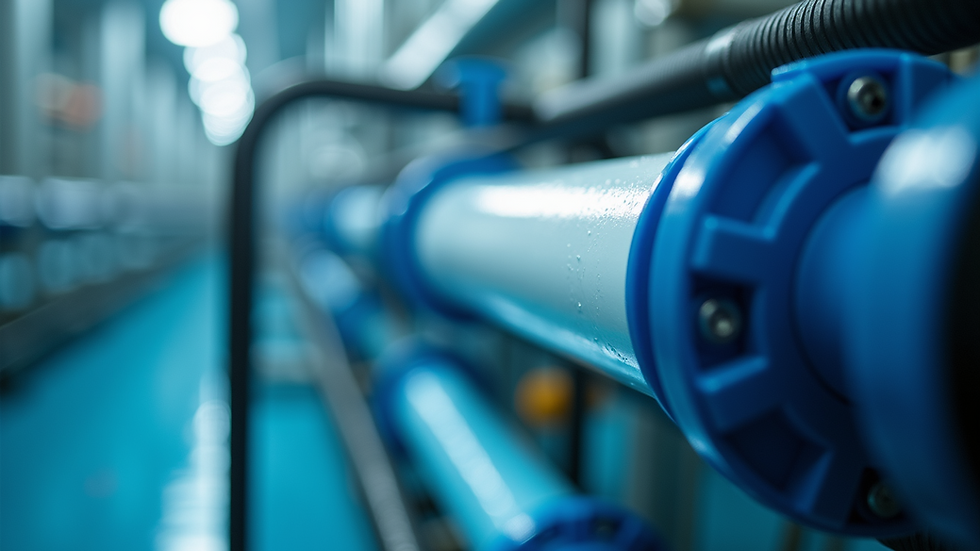How to Keep Your Yacht's Water Supply Clean and Safe
- Omri Farbstein

- Sep 8, 2025
- 3 min read
Keeping your yacht's water supply clean and safe is essential for a comfortable and healthy voyage. Contaminated water can lead to unpleasant tastes, odors, and even health risks. This guide will walk you through practical steps to maintain pristine water quality on your yacht, ensuring you and your guests enjoy fresh, safe water throughout your journey.
Understanding the Importance of Yacht Water Quality
Water quality on a yacht is often overlooked but is critical for drinking, cooking, and hygiene. Unlike land-based water systems, yachts face unique challenges such as limited storage, exposure to saltwater, and varying water sources. Contaminants can enter the system through:
Filling from questionable sources
Biofilm buildup in tanks and pipes
Cross-contamination from equipment or storage
Regular monitoring and maintenance are necessary to prevent bacterial growth, algae, and chemical contamination. Clean water not only protects your health but also preserves the yacht’s plumbing and appliances.

How to Maintain Yacht Water Systems for Optimal Quality
Maintaining your yacht water system involves several key practices that ensure water remains fresh and safe:
1. Use Trusted Water Sources
Always fill your tanks from reputable marinas or certified water stations. Avoid filling from unknown or untreated sources, as these can introduce harmful bacteria or chemicals.
2. Regularly Clean and Sanitize Tanks
Water tanks should be cleaned and sanitized at least twice a year or more frequently if you notice any taste or odor changes. The process includes:
Draining the tank completely
Scrubbing the interior with a non-toxic cleaner
Flushing with a sanitizing solution such as diluted bleach (followed by thorough rinsing)
3. Install and Maintain Filtration Systems
A good filtration system removes sediments, chlorine, and microorganisms. Consider installing filters at the water intake and before taps. Replace filters according to manufacturer recommendations to maintain effectiveness.
4. Monitor Water Quality
Use water testing kits to check for bacteria, pH levels, and contaminants regularly. This helps catch issues early before they become serious.
5. Avoid Cross-Contamination
Keep hoses, pumps, and fittings clean and dedicated to potable water only. Never use equipment that has been in contact with fuel or chemicals.

Choosing the Right Yacht Water Treatment Solutions
Selecting the appropriate water treatment system depends on your yacht size, usage, and water sources. Some popular options include:
UV Purification: Uses ultraviolet light to kill bacteria and viruses without chemicals.
Reverse Osmosis: Removes salts and impurities, ideal for converting seawater into drinking water.
Activated Carbon Filters: Improve taste and remove chlorine and organic compounds.
Chemical Treatments: Such as chlorine tablets for emergency disinfection.
For a comprehensive and reliable approach, consider a marine water solution that combines multiple technologies tailored to yacht environments. These systems are designed to be compact, energy-efficient, and easy to maintain.
Practical Tips for Daily Water Safety on Your Yacht
Maintaining water quality is not just about equipment but also daily habits. Here are some actionable tips:
Use Fresh Water First: When filling tanks, use fresh water first to flush out any residual contaminants.
Keep Tanks Full: Avoid air exposure in tanks to reduce bacterial growth.
Flush Systems Regularly: Run water through all taps and showers regularly, especially after long periods of inactivity.
Store Water Properly: Use food-grade containers for any additional water storage.
Inspect for Leaks: Check hoses and fittings for leaks or damage that could allow contaminants in.
By incorporating these habits, you reduce the risk of waterborne illnesses and maintain a pleasant onboard experience.

Ensuring Long-Term Water Safety and System Longevity
To keep your yacht’s water supply clean and safe over time, consider these long-term strategies:
Schedule Professional Inspections: Have experts inspect and service your water system annually.
Upgrade Aging Equipment: Replace old tanks, pipes, and filters to prevent contamination.
Educate Crew and Guests: Make sure everyone understands the importance of water hygiene and follows best practices.
Keep Spare Parts and Supplies: Stock essential filters, sanitizers, and testing kits onboard for quick maintenance.
By investing in proper care and education, you ensure your yacht’s water system remains reliable and safe for every trip.
Maintaining clean and safe yacht water requires attention, the right equipment, and consistent care. By following these guidelines, you can enjoy fresh water onboard, protect your health, and extend the life of your yacht’s water system. Whether you are cruising coastal waters or venturing offshore, a well-maintained water supply is a cornerstone of a successful voyage.




